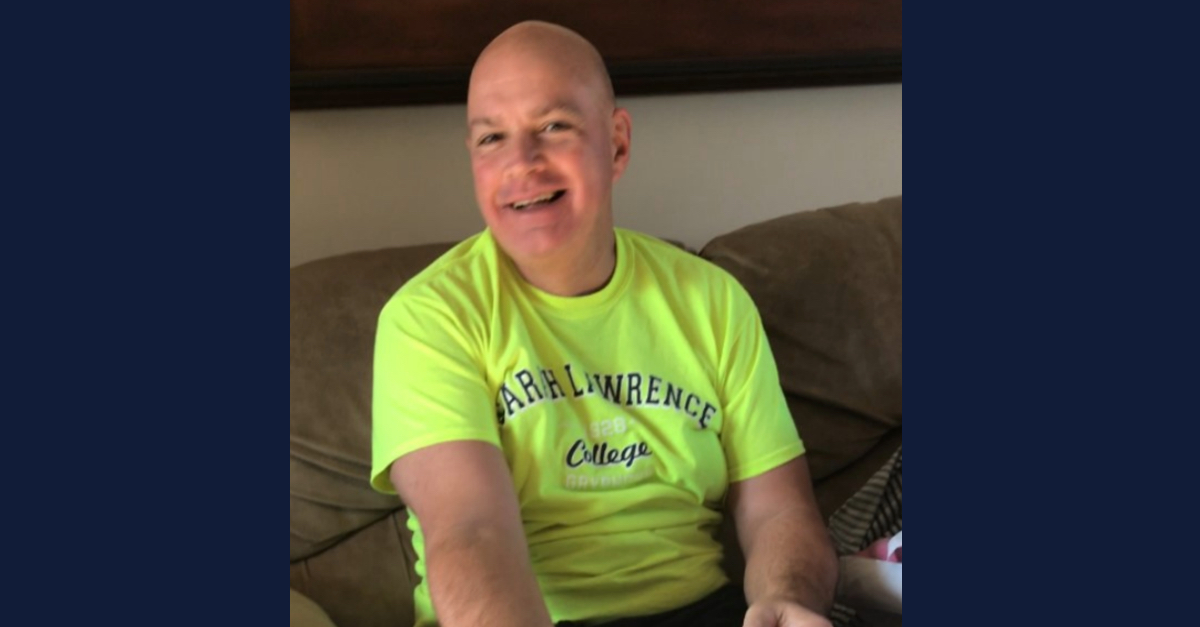
Larry Ray in a Sarah Lawrence College T-shirt.
Convicted Sarah Lawrence College sex trafficker Larry Ray cannot reverse a jury’s verdict on charges that could put him away for life, a federal judge ruled.
As summarized by U.S. District Judge Lewis Liman, Ray “unleashed a campaign of terror on his victims, all college classmates of his daughter,” when he entered into their lives in the autumn of 2010.
“He initially befriended them and then, once they were caught in his snare, he steadily groomed them, turned them into his slaves, forced them to engage in labor for his own benefit and the benefit of his relatives, extorted them, and tortured them,” Liman wrote in a 35-page opinion and order Wednesday, adding that Ray sexually trafficked one of those victims, Claudia Drury.
In harrowing testimony, Drury told jurors that Ray extorted her into massive debts that he forced her to repay with sex work. She said that she paid him $2.5 million over the course of four years, seeing as many as five men a day. Ray was a brutal taskmaster — making her work seven days a week, including holidays and her birthdays, she said.
Drury was one of five of Ray’s victims to take the stand against him at his sensational trial (which Law&Crime covered in full), and the other four belonged to same family: siblings Santos Rosario, Felicia Rosario, and Yalitza Rosario testified against Ray, as did their mother, Maritza Rosario.
Each of the Rosarios suffered a different brand of exploitation at Ray’s hands, but their stories overlapped in significant ways. They testified that Ray latched upon their insecurities to earn their trust, before pivoting to abuse and exploitation. With two of younger Rosarios, Ray would blur their sexual boundaries, then manipulate them into believing that they had harmed him. Multiple victims said that Ray forced to sign or tape record themselves making false confessions about increasingly outlandish offenses. Ray would accuse his victims — and make them believe — that they damaged his property, tried to poison him, and colluded with his enemies to undermine him.
Such behavior gave Ray a reputation as a college sex “cult” leader, and the judge’s ruling makes clear that his racketeering conspiracy thrived on psychological torment and manipulation.
“Following textbooks that [Ray] collected and studied on psychological manipulation, false confessions, and brainwashing, he turned a group of young students—his daughter’s college classmates and their siblings—into his slaves,” the ruling states. “Over a period first of months and then of years, [Ray] steadily took over the minds and the bodies of his victims. He induced them to trust him and to believe he was all powerful and all knowing. Having gained their trust and convinced them to accept his lies as their truths, [Ray] made these impressionable young individuals doubt their own memories and knowledge, cut off relations with all other adults who might otherwise have offered support and guidance, and then—having induced them to manufacture false confessions with which he could threaten them with prison or worse—he forced them to do his bidding.”
For the Rosario family, Ray’s campaign left a trail of psychological and financial devastation. All three of the siblings testified that they attempted suicide during their association with him. Santos Rosario, the son, was the one-time boyfriend of his daughter Talia Ray, and he testified that Ray ordered him to have sex with her friend Isabella Pollok, who was charged and convicted as Ray’s co-conspirator. Felicia Rosario, though never married to Ray, was known as his “wife” and pressured by him to film herself having sex with strangers. All three were urged collectively to pay Ray hundreds of thousands of dollars in imagined debts, money that came from their mother.
Judge Liman found there was “overwhelming” evidence of Ray’s extortion, pointing to a horrific night of Ray’s abuse against Drury that prosecutors called his “long night of torture.”
Starting on the evening of Oct. 15, 2018, past midnight of the following morning, Drury and Pollok broke into Drury’s room at Manhattan’s Gregory Hotel.
“Ray and Pollok expressed anger that Drury was becoming close to one of her clients and physically and psychologically abused her: They forced Drury to undress, tied her to a chair, poured water over her while she was blasted with cold air from an air conditioning unit, held a plastic bag over her head repeatedly so that she had trouble breathing, and threatened her life,” the ruling recounts. “Ray and Pollok took these actions to force Drury to ‘focus on work’ — i.e., generating sex trafficking proceeds to satisfy their extortion demands. The Jury heard an audiotape of this encounter. It then heard testimony and saw evidence that a day later, Drury was forced to hand over an additional $4,000 in prostitution proceeds.”
Beyond being a lurid tale of exploitation, Ray’s story captured public attention because of his bizarre and politically charged backstory. In the 1990s, Ray was friends and acquaintances with the elite, whether New York City-based or global. He was the best man at the wedding of then-New York City Police Commissioner Bernard Kerik, who was later shortlisted to lead former President George W. Bush’s Department of Homeland Security. Photographs from the time show Ray and Kerik together with then-New York City Mayor Rudy Giuliani and Russian President Mikhail Gorbechev.
Then, Ray’s life fell apart with his prosecution in a mafia-linked securities fraud scheme. He was later jailed during a child custody dispute, just pre-dating his association with his Sarah Lawrence College victims.
Now 63 years old, Ray will face the possibility of the rest of his life in prison when sentenced on Jan. 20, 2023.
Read the ruling here.